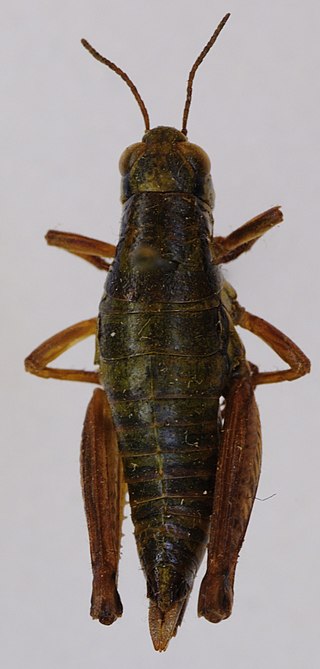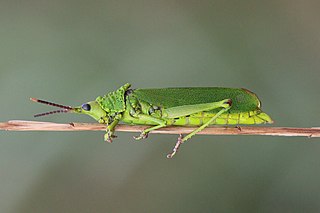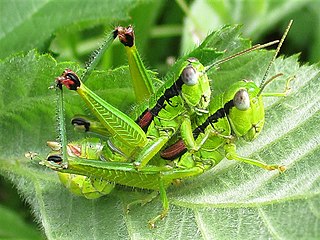
The grasshopper subfamily Acridinae, sometimes called silent slant-faced grasshoppers, belong of the large family Acrididae in the Orthoptera: Caelifera.

The Melanoplinae are a subfamily of grasshoppers in the family Acrididae. They are distributed across the Holarctic and Neotropical realms. They are one of the two largest subfamilies in the Acrididae. As of 2001 the Melanoplinae contained over 800 species in over 100 genera, with more species being described continuously.

Chorthippus is a large genus of acridid grasshoppers with around 230 described species. The genus may be subdivided into subgenera including: Altichorthippus, Chorthippus and Glyptobothrus, with other species not placed.

Pseudoprumna baldensis is a monotypic species of grasshopper in the subfamily Melanoplinae and tribe Podismini.

Podisma is a genus of 'short-horned grasshoppers' belonging to the family Acrididae and the subfamily Melanoplinae.

Podismini is a tribe of "spur-throated grasshoppers" in the family Acrididae. This tribe is unlike others in the subfamily Melanoplinae in that genera are found throughout the northern hemisphere, with a substantial number occuring outside the Americas.

The Pyrgomorphinae are a sub-family of grasshoppers in the family Pyrgomorphidae. Species are found in, especially the warmer parts of: Central and South America, southern Europe, Africa, Asia, Australia and Pacific Islands. The type genus is Pyrgomorpha and names dates from "Pyrgomorphiden" by Brunner von Wattenwyl, 1874. The first use of Pyrgomorphinae was by Krauss in 1890.
Oxyphlaeobella is a genus of grasshoppers in the family Acrididae, subfamily Acridinae. Species can be found in southern China and Indo-China.
Chlorophlaeoba is a genus of grasshoppers in the family Acrididae, subfamily Acridinae. Species can be found in southern China and Indo-China.
Trigonopteryx is a genus of Asian grasshoppers: typical of the family Trigonopterygidae.

Odontopodisma decipiens is a species of spur-throated grasshopper in the family Acrididae. It is found in Europe.
Podismopsis is a genus of grasshoppers in the subfamily Gomphocerinae and tribe Chrysochraontini, erected by Zubovski in 1900. Species have been recorded from central Europe through to temperate east Asia, including Japan.
Rammeihippus is a genus of grasshoppers in the subfamily Gomphocerinae, erected by Woznessenskij in 1996 as a nomen novum. As of 2022 there are two known species with a recorded distribution in the Balkans and Turkey.
Nocaracris is a genus of European and western Asian grasshoppers in the family Pamphagidae, erected by Boris Uvarov in 1928. It is the type genus of the tribe Nocarodeini and has a recorded distribution of Greece through to Afghanistan, but this may be incomplete.
Paranocarodes is a genus of European and western Asian grasshoppers belonging to the family Pamphagidae, erected by Ignacio Bolívar in 1916. Belonging to the tribe Nocarodeini, species can be found from Greece through to Iran.
Glyphotmethis is a genus of mostly European grasshoppers belonging to the family Pamphagidae, erected by Bey-Bienko in 1951. Belonging to the tribe Thrinchini, species can be found in south-eastern Europe through to Turkey.

Zeuneriana is a genus of Palaearctic bush crickets in the tribe Platycleidini and now placed in the genus group Metrioptera F. E. Zeuner: after whom it was named by W. Ramme in 1951. The recorded distribution of species is: mainland Europe, from Spain and France through to the Balkans and Romania.
Eremippus is a genus of Palaearctic grasshoppers in the tribe Dociostaurini, erected by Boris Uvarov in 1926. Species are recorded from eastern Europe and central Asia through to eastern China.
Oropodisma is a genus of Palaearctic grasshoppers in the tribe Podismini and subtribe Miramellina erected by Boris Uvarov in 1942. Species have a recorded distribution from the Balkans through to the Bosphorus.

Cophopodisma is a genus of Palaearctic grasshoppers in the tribe Podismini and subtribe Miramellina, erected by D.P. Dovnar-Zapolskij in 1932. Species records have a highly disjointed distribution, with two species from Spain and France and C. yunnanea from China.










